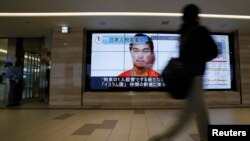The Islamic State group’s apparent beheading of one Japanese hostage and its threat to kill a second are stark reminders to Tokyo that its increasing diplomatic profile and close friendship with the United States make it a target for terrorists. The hostage crisis could likely further polarize Japanese opinion over Tokyo’s plan to play a more active role in global security.
Japanese Chief Cabinet Secretary Yoshihide Suga said Monday the government is working closely with the Jordanian government to secure the release of remaining Japanese hostage Kenji Goto.
Suga said human life remains the Japanese government's priority, so from that perspective they are working closely with the Jordanian government, related tribal chiefs and religious leaders and other such organizations.
He also said Japan has not had direct contact with the Islamic State militant group.
Islamic State militants who are holding war correspondent Kenji Goto claimed to have beheaded a second hostage, self-employed security contractor Haruna Yukawa. The group had set a $200 million ransom for release of the two men and set a 72-hour deadline for payment that expired January 23.
In a video posted online Sunday, a voice that is purportedly Goto’s says the militants have dropped their ransom demand and will free him in exchange for the release of Sajida al-Rishawi, an Iraqi held in Jordan.
"So, you don't need to worry about funding terrorists. They are just demanding the release of their imprisoned sister Sajida al-Rishawi. It is simple,” Goto says in the clip.
Al-Rishawi was arrested in 2005 for attempting to blow herself up in one of three deadly hotel bombings in Amman.
The hostage crisis comes at a time when Japan‘s Prime Minister Shinzo Abe is trying to play a more active role in global security.
The $200 million ransom demand made by the militants was the same amount Prime Minister Abe pledged in nonmilitary aid for refugees displaced by the rise of the Islamic State, which holds large parts of Iraq and Syria.
Abe is also trying to change Japan's pacifist constitution to allow the military to act more “proactively” to protect the lives of its citizens and defend the nation and its allies. His “proactive pacifism” plan has been controversial in Japan and in the region due to the country's past wartime aggression.
Koichi Nakano, a professor of political science at Sophia University in Tokyo, said the hostage crisis will likely further polarize the public.
“On the one hand, the government would make the argument that this is the reason why we need the government to be more proactive in taking part in the war on terror but a large number of the Japanese remain unconvinced that that is actually the case,” said Nakano.
Professor Nakano said underneath Abe’s strong support in the polls in the midst of this hostage crisis, there is also concern that he is exposing Japan to greater risk by taking on a more high profile military and diplomatic role.





